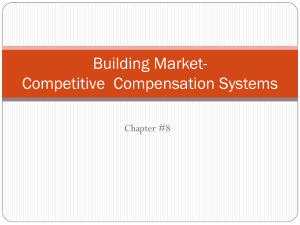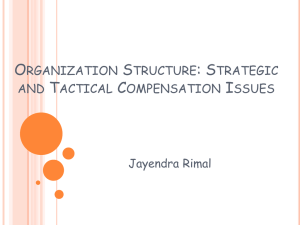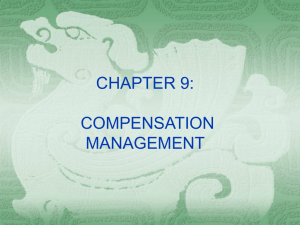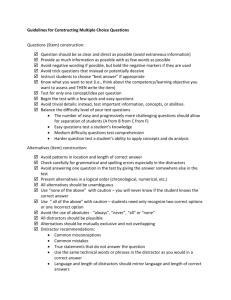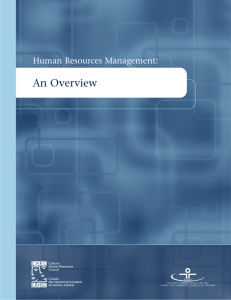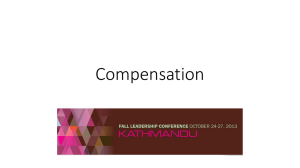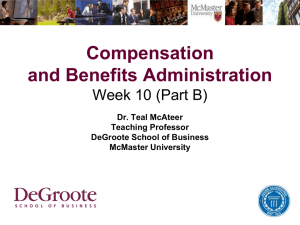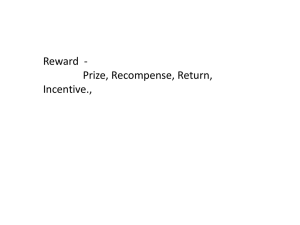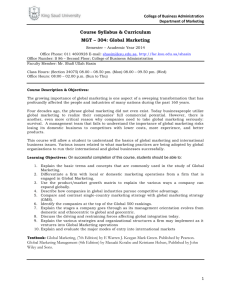HRM Revision
advertisement
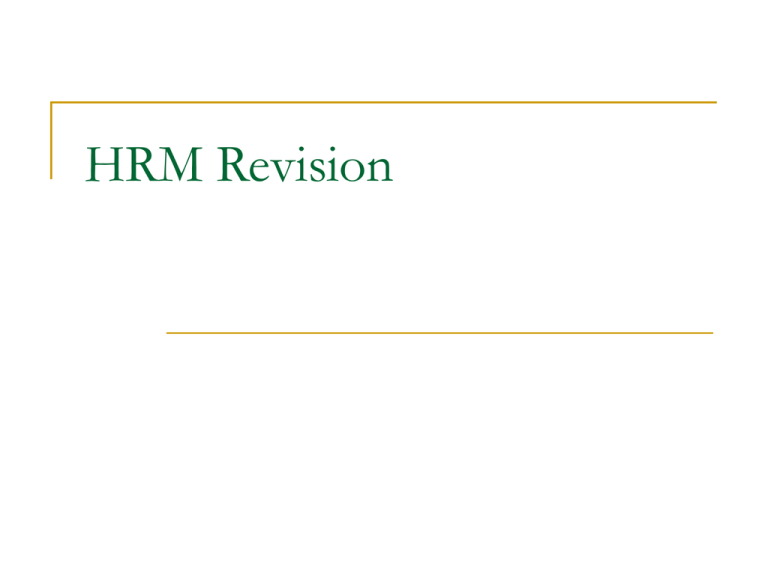
HRM Revision Chapters in focus Chapter 7 Chapter 8 Chapter 9 Chapter 10 Chapter 11 Chapter 13 Chapter 16 Chapter 17 Examination Format Section 1: Multiple-choice or True/False question There are 20 multiple-choice or True/False questions in this section. ONE (01) mark for each correct answer. MCQs are belonged to the chapters of short and long answer questions. Section 2: Short-answer question There are 5 short-answer questions in this section and 8 marks for each correct answer. Section 3: Situational question/ Case Study Tutorial activities MCQs: all chapters True or false MCQs MCQs on Situation Short-answer Focus on the key-term in the end of each chapter. Chapter 7,8, 10,11. A case study Similar to the tutorial activities. Chapter 9, 13, 16 Sample 1. Employees’ total compensation consists of which the following? A. Base compensation, personnel costs, payroll B. Payroll, base compensation, indirect compensation C. Benefits, pay incentives, personnel costs D*. Base compensation, pay incentives, indirect compensation E. Payroll, pay incentives, base compensation Cornilia is concerned that her roommate, who works for a different company, does for a very similar job,receives about 25% more pay and better benefits than Cornilia. Cornilia’s concern reflects the compensation issue of: A. Job v.s individual pay B. *External equity C. Open v.s secret pay administration D. Fixed v.s variable pay E. a and D Discuss plantwide incentive plans by explaining the theory behind the plans, how they work, what the disadvantages are, and under what conditions they work best. Answer: Definition of Plantwide plan, gainsharing, Scanlon, Rucker, Improshare should be named. Disads: carries poor performers, problems with choosing criteria, can cause labor-management conflict. Work best in with small to mid-sized business where technology can give gains. You need a participative management philosophy and a relatively stable market for your product. Global Case 16.3 Mental Health: A Global Concern Critical Thinking Questions Mental health problems often have a negative stigma. What, if anything, do you think companies can do to reduce this stigma? Privacy issues should be mentioned here as well as the successful implementation of diversity training and employee wellness programs. Recognizing the importance of mental health in the workplace seems like the only moral thing to do. Yet, employers face difficulties in effectively dealing with this area. For example, mental health is less viable and apparent than physical health. How can an employer be protected from feigning and fraud if it takes a liberal approach to dealing with mental health? Answers will very, but may include reference to the offer to seek outside services through a list of recommended providers, implementation of an EAP program or flexible scheduling to allow workers time off to tend to their mental health needs. Mental health problems can be caused by many factors outside of the workplace. For example, genetics and family life may predispose or cause mental health difficulties. Nonetheless, these difficulties can show up in the workplace. Does the employer have some responsibility for dealing with these mental health problems? Explain. Answers will vary, however it should be mentioned that employers can ultimately be held responsible for what happens in the workplace. Situational question Millions of people use social networking Web sites, such as Facebook and MySpace, to share personal information, including photos and videos with their friends. Should companies use social networking Web sites as a communications tool to build employee networks? What are the advantages and the disadvantages of using social networking Web sites as informal communication channels for employees? Answers will vary; however, it is important to note that social networking sites are often a great way for companies to communicate with employees as well as potential employees and add to the openness of their culture. On the negative side, it is important for employees to have some refuge from their day-to-day work. Social networking sites sometimes contain information or images that companies might be best served not being involved with and sometimes can create a forum where an individual with questionable content them becomes associated with that firm. In sum, the employee has full control over site content but they are identified as an agent of the organization. Sample situation of the mistake:Not having clear standards Why was it a mistake? Workers need clear standards – they need to know what the manager’s expectations are for a successful result. Look at the disagreement between Larry and his manager, not because he didn’t perform but because they each had a different standard for what would be successful performance. Sometimes measurements need to be very exact. EX: A workgoup that produces spare parts for machinery needs to know the tolerances and the tensile strength that the customer needs. It can err by producing parts that fail to meet these tolerances and strength requirements. It can err just as easily by wasting time crating closer tolerances and higher tensile strength than the customer needs. Even workers in whiter-collar or knowledge-work jobs need clear standards, although they may not be as exact as those used in manufacturing. Worker and manager can agree to a standard which keep them both looking for the same range of result. How can you recover from it quickly? Be sensitive and flexible. You can turn the situation around immediately, make it become a productive session between the two of you. You should appreciate his improvement, anyway, he did it, and you cannot change it, for him, that was good. The importance is your relationship between you and him, as well the motivation and satisfaction with the work. What happened, happened, you cannot change it, but you can make the future better. To conclude, you should change the conversation, make it productive by appreciate his improvement and remind him about the standard, and have his promise on improvement from next quarter. How can you consistently do it right from now on? Be very clear about the objective/ standard Identify the critical elements of a successful result Put together preliminary standards based on the critical elements Keep working with and improving the standard Your recommendation to managers: Whenever it’s possible, there’s always one effective standard: customer satisfaction. If your workgroup produces a product or service for identified customers, always look to them for the basic standard. How could you do this? (suggested activities) Create a standard form to survey customers at the completion of every project or job Have workers visit customers o get their reactions Call customers yourself, on a random basis or on a regular schedule Hold periodic focus groups with customers, preferable conducted by individuals who have no connection with you and your workgroup.


